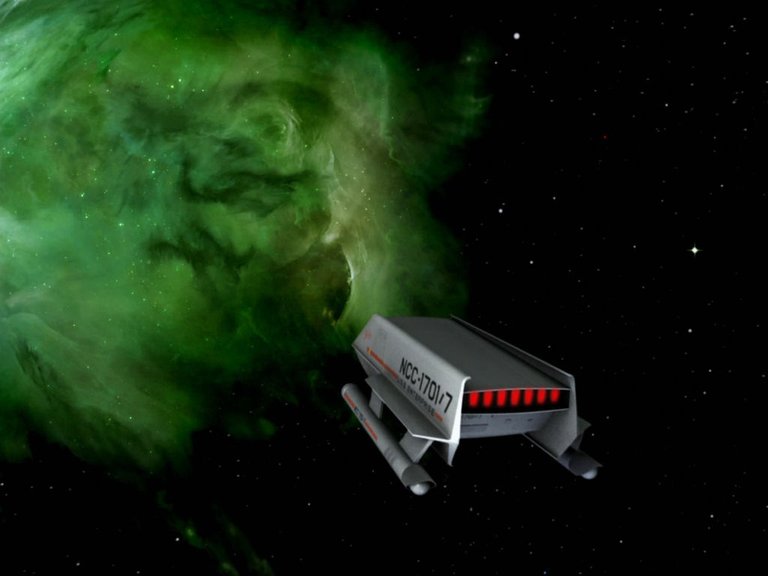Television Review: The Galileo Seven (Star Trek, S1X14, 1967)

The Galileo Seven (S01E14)
Airdate: January 5th 1967
Written by: Oliver Crawford & S. Bar-David
Directed by: Robert Gist
Running Time: 50 minutes
The Galileo Seven, a first-season episode of Star Trek: The Original Series, exemplifies the paradoxical nature of the show’s early years: while boldly venturing into uncharted territory to explore futuristic ideals and social commentary, it frequently drew upon narrative frameworks rooted in mid-20th-century storytelling traditions. This is particularly evident in The Galileo Seven, an episode that functions as an unofficial remake of Five Came Back, a 1939 adventure film credited with laying the groundwork for disaster genre tropes. The connection between the two works underscores not only the creative reuse of familiar plots but also a subtle homage to the history of the franchise itself, as Five Came Back featured Lucille Ball in one of her earliest leading roles—a woman who would later co-found Desilu Productions, the studio responsible for bringing Star Trek to television. This layered relationship between past and present, both narratively and industrially, situates the episode as a fascinating bridge between eras.
The link to Five Came Back extends beyond mere thematic parallels. The 1939 film, which follows a group stranded in a jungle after a plane crash, directly inspired the survival scenario at the heart of The Galileo Seven. By transposing this premise into a futuristic setting—replacing a jungle with an alien planet and humans with a mixed crew of Starfleet personnel—the episode demonstrates Star Trek’s ability to repurpose classic tropes while infusing them with sci-fi innovation. The choice to adapt a story involving Lucille Ball, whose professional legacy indirectly funded Star Trek, adds an intriguing layer of irony, as if the series were paying tribute to its own origins through narrative reinvention. This duality—honouring cinematic history while pushing boundaries—captures the show’s dual identity as both a product of its time and a visionary work.
The plot of The Galileo Seven unfolds as the USS Enterprise en route to Makus III to deliver medical supplies encounters the enigmatic Murasaki 62, a quasar-like formation that sparks scientific curiosity. Captain Kirk dispatches a science team aboard the shuttlecraft Galileo, led by Spock, with the aim of conducting a brief exploration. The crew includes McCoy, Scotty, and four junior officers: Lt. Boma (Don Marshall), Lt. Gaetano (Peter Marko), Lt. Latimer (Rees Vaughn), and Yeoman Mars (Phyllis Douglas). During their mission, the shuttle is abruptly pulled off course by the formation’s gravitational anomalies, leading to a crash landing on the fog-shrouded planet Taurus II. There, the team faces hostile, ape-like creatures wielding primitive weapons. As tensions rise and casualties mount, Spock’s logical decision to jettison equipment—and even corpses—to lighten the shuttle for liftoff clashes with the emotional resistance of his subordinates, who resent his callous pragmatism.
Despite the limitations of 1960s television—stereotypical monster designs, constrained special effects, and a script by Oliver Crawford and S. Bar David that occasionally lapses into melodrama—the episode holds up remarkably well. The core scenario from Five Came Back gains depth through its sci-fi adaptation, as the ethical dilemmas of survival are amplified by the isolation of space travel and the crew’s reliance on technology. The question of whether to prioritise logic over humanity becomes more pressing in this high-stakes environment, a theme that resonates with Star Trek’s broader exploration of human (and alien) nature. While the dialogue occasionally feels dated, the interpersonal conflicts—particularly between Spock and the more emotional officers—retain a visceral urgency, anchored by strong performances, especially from Leonard Nimoy’s Spock, whose unwavering Vulcan discipline is both admirable and alienating.
The episode holds historical significance as the first to feature a shuttlecraft, a staple of the Star Trek universe that would later become iconic. More importantly, it marks a rare instance where Spock assumes a leadership role, showcasing his strengths and vulnerabilities in a way that humanises him. His struggle to balance duty with empathy mirrors Kirk’s frequent challenges but highlights the pitfalls of pure logic when commanding humans. This dynamic not only enriches Spock’s character but also underscores the show’s recurring theme of the interplay between reason and emotion—a tension that drives much of its drama.
However, the episode’s flaws are equally notable. The ape-like creatures on Taurus II, with their comically oversized props and repetitive attacks, reflect the budgetary constraints of early Star Trek, evoking the low-budget B-movie monsters of the era. Combined with an abrupt tonal shift in the finale, where the surviving crew members erupt into laughter—a resolution that feels both anticlimactic and tonally jarring—the episode’s reputation as a mid-tier instalment is understandable. These elements, alongside the episodic feel of the plot, contribute to why The Galileo Seven is often overshadowed by more celebrated episodes like The City on the Edge of Forever or Balance of Terror.
The Galileo Seven is a flawed yet intriguing episode that illustrates Star Trek’s early creative ethos: a willingness to repurpose established narratives while pushing narrative and thematic boundaries. Its adaptation of Five Came Back succeeds in transplanting disaster tropes into a futuristic context, albeit with concessions to the era’s technical and financial realities. Ultimately, it stands as a testament to Star Trek’s ability to weave old and new, even when the seams occasionally show.
RATING: 6/10 (++)
Blog in Croatian https://draxblog.com
Blog in English https://draxreview.wordpress.com/
InLeo blog https://inleo.io/@drax.leo
InLeo: https://inleo.io/signup?referral=drax.leo
Hiveonboard: https://hiveonboard.com?ref=drax
Rising Star game: https://www.risingstargame.com?referrer=drax
1Inch: https://1inch.exchange/#/r/0x83823d8CCB74F828148258BB4457642124b1328e
BTC donations: 1EWxiMiP6iiG9rger3NuUSd6HByaxQWafG
ETH donations: 0xB305F144323b99e6f8b1d66f5D7DE78B498C32A7
BCH donations: qpvxw0jax79lhmvlgcldkzpqanf03r9cjv8y6gtmk9